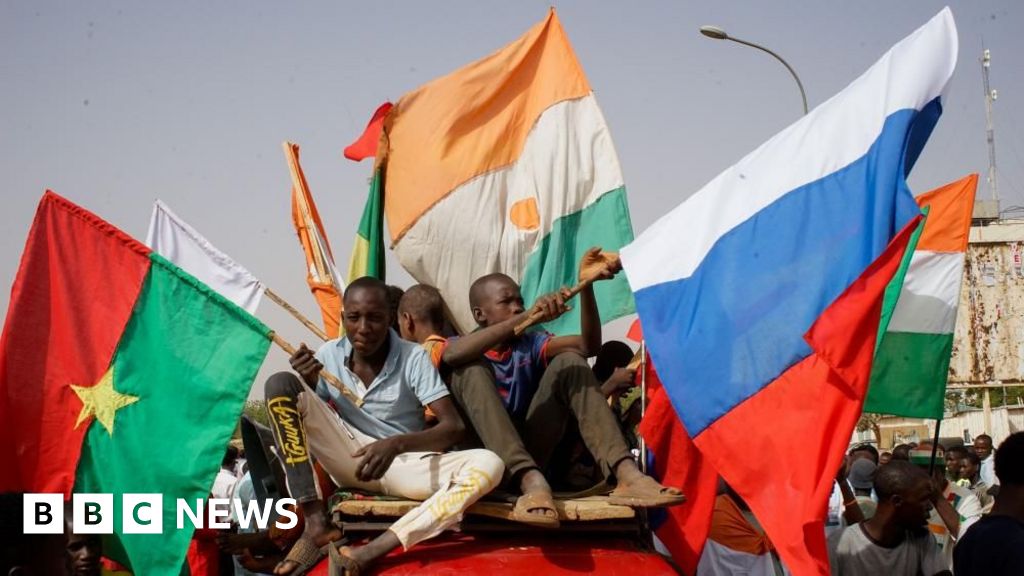West Africa analyst
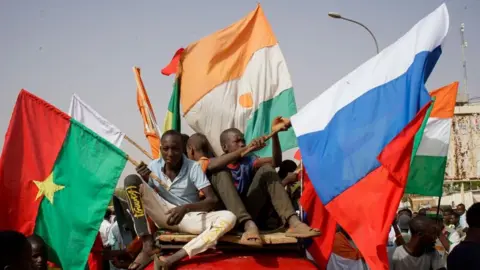 EPA
EPARussia has dangled the possibility of building a nuclear power plant in uranium-rich Niger – a vast, arid state on the edge of the Sahara desert that has to import most of its electricity.
It may be deemed impractical and may never happen, but the concept is yet another move by Moscow to seek a geopolitical advantage over Western nations.
Niger has historically exported the metal for further refining in France, but that is changing as the military-led country cuts off ties with the former colonial power.
The uranium-mining operation operated by French nuclear group Orano was nationalised in June, which cleared the way for Russia to put itself forward as a new partner.
It is talking about power generation and medical applications, with a focus on training local expertise under a co-operation agreement signed between Russian-state corporation Rosatom and the Nigerien authorities.
If ever brought to fruition this would be the first nuclear power project in West Africa.
Beyond initial discussions, it is unclear how far down this road things will progress. But already, with this first move, Moscow has shown that it grasps the depth of local frustrations.
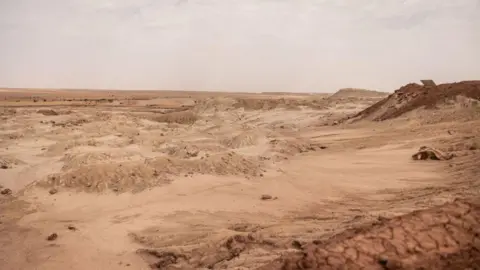 AFP/Getty Images
AFP/Getty ImagesFor more than five decades Orano – which until 2018 was known as Areva – mined Niger’s uranium, to supply the nuclear power sector that is at the heart of France’s energy strategy.
The French government-owned company now gets most of its supplies from Canada and Kazakhstan and has projects in development in Mongolia and Uzbekistan.
But the Nigerien connection remained significant and freighted with a degree of political and perhaps even cultural weight.
Yet Paris did not share its nuclear energy knowhow with its loyal African supplier. Niger, meanwhile, has to rely largely on coal-fired generation and imports of electricity from Nigeria.
But now, the rupture in relations between Niger’s junta and France has allowed Moscow to offer the hope, however distant, of a nuclear future, something that Areva/Orano, over so many years of local operation, had failed to do.
“Our task is not simply to participate in uranium mining. We must create an entire system for the development of peaceful atomic energy in Niger,” Russian Energy Minister Sergei Tsivilev declared on 28 July during a visit to Niamey.
Naturally, this is not entirely altruistic. There are economic benefits for Russia and it is part of a broader push to displace Western influence from the Sahel region.
The Russians could get the chance to develop the mine in Imouraren, one of the world’s largest uranium deposits.
A French plan to develop the site was initially stymied by the slump in world uranium demand after the 2011 Fukushima nuclear accident in Japan. It was revived in mid-2023, only for the military junta that seized power weeks later to then cancel Orano’s rights to the Imouraren deposit.
Getting hold of this key asset would cement Russia’s already important position in the global production of uranium, a commodity now so vital to world hopes that nuclear power will help in reducing greenhouse gas emissions.
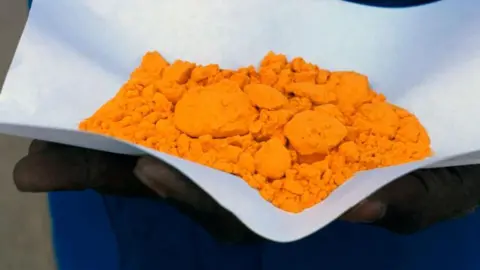 Getty Images
Getty ImagesAnd they may well be able to buy up, at a favourable price, all or part of the up to 1,400 tonnes of semi-processed uranium “yellowcake” concentrate that is awaiting export from the Sominak mine operated by Orano at Arlit that was seized by the state in June.
Stocks first piled up after the West African regional bloc, Ecowas, imposed a trade blockade on Niger following the overthrow of Mohamed Bazoum, the country’s civilian president, in July 2023. But even after sanctions were lifted the new military regime prevented Orano from resuming shipments.
At one stage China also showed interest in buying some of the concentrate.
The Nigeriens even explored contacts with Iran until the US warned them off pursuing any sale in that particular direction.
Of course, the picture of a Nigerien nuclear power station that Tsivilev has painted poses huge questions – technical, economic and in relation to security in a region notorious for Islamist militancy.
Indeed, the French never seem to have felt the option was worth serious consideration.
For while the refining of ore into yellowcake can be done in Niger, the subsequent conversion, enrichment and transformation into nuclear fuel was being carried out abroad, at Orano’s plant at Cap de la Hague in Normandy.
From there it was delivered to France’s nuclear power stations.
Building a nuclear plant can take years and such projects require a huge amount of capital investment, and once operational they need a large and secure power supply.
Furthermore, viability depends on the availability of industrial and domestic consumers who can afford the price of the power being generated.
There are also questions over whether a nuclear power plant could be safely built and protected in today’s fragile and violent Sahel region. Jihadist armed groups control large areas of terrain in Mali and Burkina Faso, and parts of western Niger which makes the area highly insecure.
Given the time, the costs and the complications of developing the nuclear sector in Niger, this remains a distant prospect.
It probably does not offer an early means of easing the current pressure on energy supply or its need for economic diversification.
But in a sense, these technical questions are missing the point.
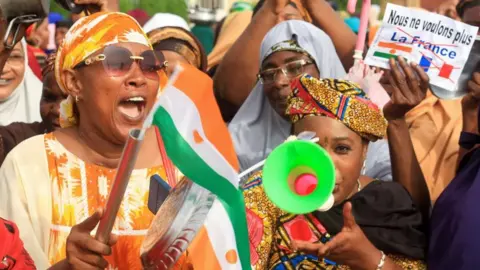 Reuters
ReutersWhat Russia has seized on is Nigeriens’ sense of resentment at the French assumption that they should be content to indefinitely remain a supplier of raw minerals, without the hope of ever graduating to a more industrialised level.
Allied military regimes in neighbouring Mali and Burkina Faso have now applied their African sovereigntist vision to their biggest export, gold.
New mining rules force foreign investors to give larger roles to local business partners and ensure that some of the production is refined locally, keeping more of the “added value” of jobs and profit at home.
Mali has even detained some executives of the Canadian gold mining firm Barrack for months in a dispute about revenue.
Now Niger has also played hardball.
The shutdown and eventual nationalisation of Orano’s operations have been surrounded by mutual recrimination, with the government and the company accusing each other of obstructiveness.
The group’s director in the country, Ibrahim Courmo, has been held in detention without charge since May.
And the junta in power today now seems determined to bring the era of French uranium mining in Niger to an end, with one official telling the Paris newspaper Le Monde that Orano had been “stuffing itself with our country’s natural resources”.
Who can say what Moscow’s proposals for nuclear scientific partnership and perhaps even power generation will ever amount to in concrete terms?
But one thing is clear, in Niger it is the Russians who have correctly read the political mood.
Paul Melly is a consulting fellow with the Africa Programme at Chatham House in London.
You may also be interested in:
 Getty Images/BBC
Getty Images/BBC
